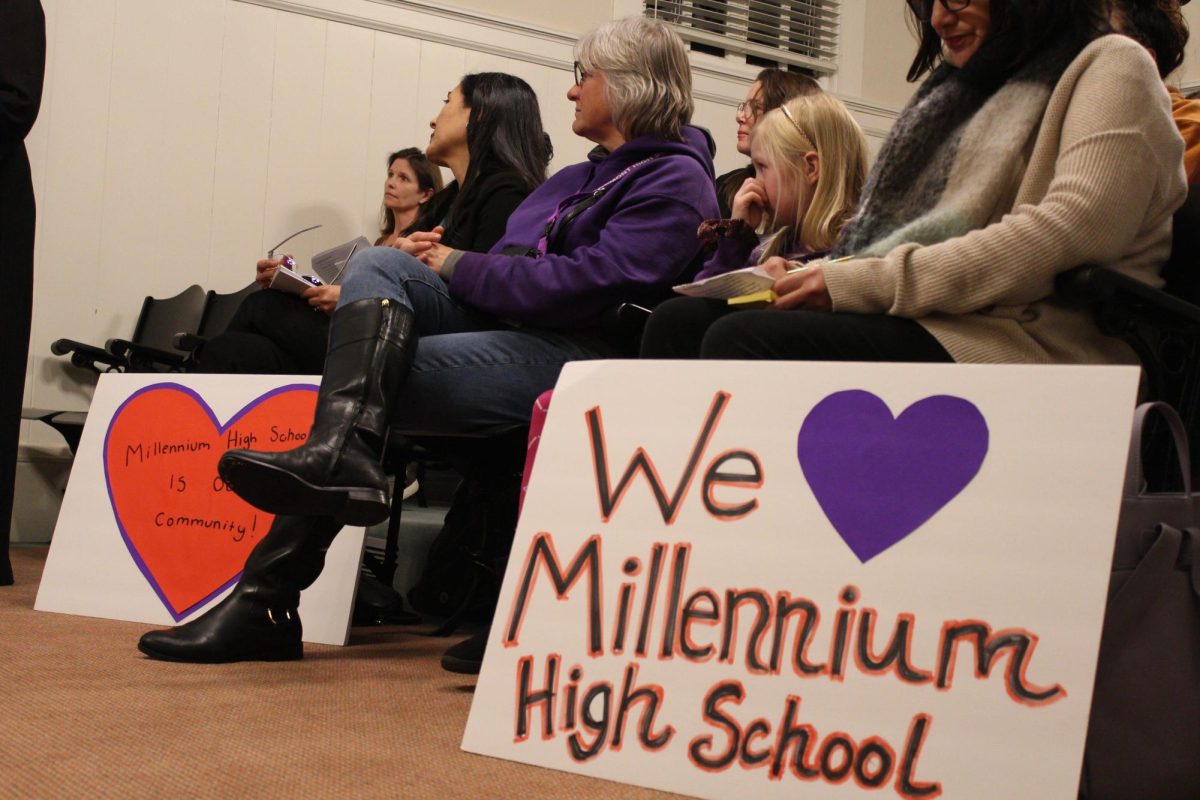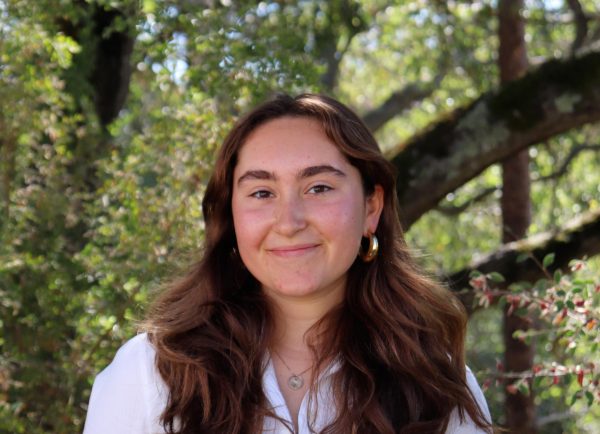Update as of April 19, 2024
Joint Statement from PUSD Board, Superintendent, and APT
Dear PUSD Families and Community Members,
On Wednesday, the Superintendent, two Board members and several APT union leaders met for a clarifying discussion. This meeting was productive and both sides learned more about the other’s perspective in ways that we believe will facilitate moving forward to a settlement.
Board members and the superintendent learned that for teachers, the impact of the April 16 community statement was very different from what was intended. The intent of the statement was to communicate where we are currently in the labor bargaining process and to convey our desire to reach agreement as soon as possible with a deal that shows how much we value our district’s teachers. However, some of what was said came across as blaming teachers for the failure of Mediation and as implying that teachers had not moved from their original ask for 8.22% COLA. This caused distress to teachers and misunderstandings in the community.
At the same time, APT came to understand that there was a genuine misunderstanding about what ended Mediation that resulted in the Board and the Superintendent believing it was unilaterally initiated by the union.
Both sides now see more clearly how much the rigid and secretive nature of the Mediation process has made clear communication between the groups and with the community unusually challenging. Both sides regret any misunderstandings.
The Board and the Superintendent want to affirm that APT has indeed come to the bargaining table in good faith, and (while the rules of Mediation prevent us from being specific) that they have moved dramatically from their original 8.22% ask.
APT wants to affirm that the Board and the Superintendent have been transparent about the state of the district budget and that they recognize the real financial need of teachers and have been exploring productive solutions to raise compensation.
Thanks to our conversation on Wednesday, both sides were also able to gain clarity on some key non-monetary issues that are still to be resolved, and we were able to gain a better understanding of why these issues matter to each team.
As we await the formation of a Fact-Finding panel, the process allows us to continue talking and working on a deal. At our meeting on Wednesday, we agreed that both sides would very much like to resume bargaining face-to-face as soon as possible in hopes of reaching agreement more quickly than Fact-Finding would allow. And the Board has scheduled a closed session meeting this Saturday to discuss negotiations to ensure these face-to-face meetings with APT can resume as early as next week.
Moving forward, both sides want to affirm our trust in each other and our deep desire to reach a resolution.
Veronica Anderson Thigpen
President
Piedmont Board of Education
Jennifer Hawn
Superintendent
Piedmont Unified School District
Elise Marks
President
Association of Piedmont Teachers (APT)
Update on April 16, 2024
Timeline of APT events

Update on 2, 2024
APT Applies for Fact-Finding after Lack of Progress in Mediation
Ken Glenn, the mediator for negotiations between Association of Teachers (APT) and District management, officially released both negotiating parties from mediation on March 29. On April 3, APT leadership notified APT members by email that mediation failed and APT would apply for fact-finding. APT officially requested the formation of fact-finding on April 10.
Fact-finding is a process where a panel hears from both negotiating parties, assembles a report, and proposes a compromise. The panel is composed of one member chosen by APT, one member chosen by District management, and a neutral member appointed by the Public Employee Relations Board (PERB). The panel has 30 days to convene and assemble a report.
According to Superintendent Jennifer Hawn’s April 15 Piedmont Pulse, the panel analyzes relevant information, including the union contract and district budget. If neither side accepts the new compromise, they can go back to mediation and fact-finding, or the District can impose a ‘last best offer.’ The union can either accept that offer or strike.
PERB has been backed up recently because they are currently dealing with several other districts in mediation, Marks said. Because of this backup, an exact timeline for the future is still uncertain. However, fact-finding and the following steps, including the option to strike, are expected to not be complete before the summer and into the next school year.
“We might get the report before school gets out,” Marks said. “But our CTA rep thinks it will probably take until the summer.”
APT released the following statement:
APT vowed publicly to negotiate in good faith during Mediation and to do everything we could–including moving very significantly from our original stance on compensation–to reach an agreement that would work within the district budget and enable PUSD educators to afford to keep doing their jobs. And we kept our word. We went in with high hopes that we could reach a fair and reasonable settlement. Unfortunately, despite four long Mediation sessions, final agreement could not be reached with district management, and Mediation failed. We are devastated by this result. This is the first time in the memory of anyone currently working in the district that APT and district leadership have failed to reach agreement. At this point, we are forced to take the next step and apply through the Public Employment Relations Board for the formation of a Fact-Finding panel to hold a hearing to consider the details of the case. It’s important for the public to understand that Fact-Finding is not an audit, and no new “facts” will be found, so it’s incumbent upon district leadership to find a solution so great teachers can stay in Piedmont with their students. APT has not given up on finding resolution, and hope district leadership understands how urgent it is that we do so.
Update on March 15, 2024
Instead of wearing their usual red, or even their statement black, Association of Piedmont Teachers [APT] and Classified School Employees Association [CSEA] members walked into the Feb. 28 school board meeting donning a different color: purple. In a time of unprecedented uncertainty surrounding the district’s future, APT members said they were sending a message.
“That was our sign of community solidarity,” APT President Elise Marks said. “[APT and CSEA] were all Piedmont, working together for the good of our schools.”
The sight of the APT and CSEA all wearing purple brought the superintendent to tears.
“I literally almost started crying,” Superintendent Jennifer Hawn said. “I’m not even exaggerating. This is what I want. I want us all to have this dream, to have everyone collaborate and be united.”
The District has been busy in their efforts to seek revenue in order to compensate for decreasing enrollment, meet the demands of the APT by increasing compensation for staff, and reduce the original extensive set of budget cuts that received pushback from the community. They found areas to save money in reductions to staff and a potential parcel tax increase for Piedmont residents.
STAFF REDUCTIONS
Reductions to classified staff were approved by the Board of Education at the special school board meeting on March 4. After the original resolution’s proposal on Feb. 12, District management to follow through with cuts to all but five originally proposed positions.
The revised resolution was approved unanimously by the Board, and no longer includes cuts to counseling, special education, and art teaching services at the elementary school level, as well as special education and art teaching services at PHS and MHS. Cuts remain to Physical Education, and the high school’s World Language, English, and Librarian Services departments. Cuts to five CSEA positions, including paraprofessionals, technicians, and district management administrative assistants were also approved unanimously.
“I think people are super relieved that [special education] has been restored because I think those are our most vulnerable students. And, if the support isn’t there for them, they’re gonna suffer the most,” Marks said. “So very relieved about that, very relieved about art.
Hawn said District management might be able to revoke some cuts by the end of the school year.
“Some of [the initial cuts] may not ultimately be full layoffs. We may be able to pull those back,” Hawn said. “So, I’m anticipating [students] are going to see some shifts on [the cuts] in a couple months.”
The initial proposal of staff cuts aimed to minimize District spending by a minimum of $2.3 million, providing an adjustment for decreasing enrollment and funding the three-year salary increase District management has offered to APT members. Student enrollment in PUSD has decreased by 11 percent since 2018, according to Alahydoian.
“At this point, change is essential, as our budget cannot sustain our current programs and our efforts to offer competitive compensation increases to our staff,” Hawn said in her Feb. 26 newsletter, the Piedmont Pulse. “We must change.”
PUSD Chief Business Executive Ruth Alahydoian said the District’s current three-year offer to employees ( 2 percent this year, three percent next year, and four percent the following year) required two sets of $1.4 million cuts, one for the 2024-25 school year and one for 2025-26, or an upfront set of $2.3 million dollars cuts this year.
“The reductions still have to happen because we have to meet next year’s goal for the compensation,” Hawn said.
Assistant to the Assistant Superintendent Mary Leon is leaving the district years after her position was cut. She previously worked as a paraeducator at Havens, and has been in the district for more than 20 years.
“I understand that the Board [is in] a really hard position,” Leon said. “I really feel for them, but I’m really sad that after twenty years in the district, this is the way I have to be leaving.”
Leon said she hopes to continue working with young adults for the rest of her life.
“I came here to get my own kids in the district, but I’ve stayed for you guys,” Leon said. “[PUSD students] are so awesome. You’re so beyond what I ever could have done at your age.”
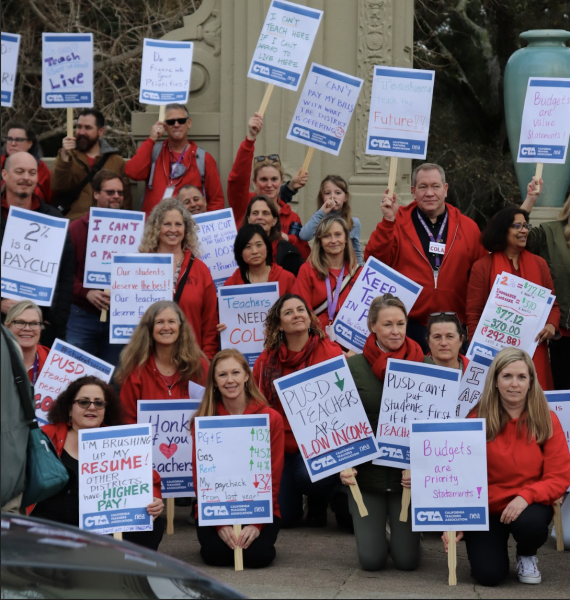
MEASURE H PARCEL TAX
At the Feb. 28 School Board meeting, board members decided to move forward in the process of increasing the existing Measure H Parcel tax on Piedmont residents to generate more revenue for hiring and retaining teachers.
“An increase to Measure H would enable the District to offer improved compensation and slow down on some of the staffing reductions,” Hawn said in the Feb. 26 Piedmont Pulse.
Measure H was first passed in November 2019 with 74 percent approval by Piedmont voters. It generates revenue specifically for recruiting and retaining teachers. Piedmont voters have approved several parcel taxes for Piedmont schools since 1985, said PUSD Chief Business Officer (CBO) Ruth Alahydoian in a presentation at the Feb. 28 board meeting.
The School Board is looking to increase Measure H from the current $0.25 per sq. ft. of property, but Hawn said it is not yet clear how much of an increase the Board will propose.
Marks said that the prospect of community support in the form of a parcel tax is an optimistic sign for negotiations.
“The possibility of increased funding for our schools brings us the greatest sense of hope that [the APT] has felt since the negotiation process began last spring,” Marks said.
Measure H currently generates approximately $2.6 million per year, Alahydoian said. Hawn said the revenue is allocated among all staff except for the superintendent, assistant superintendent, and CBO.
Increasing the parcel tax would be a multi-month process. To increase the parcel tax, the School Board must first survey the community, draft a resolution, and ensure the proposed increase will be on the 2024 November election ballot. In order to pass, it needs two-thirds voter approval.
School Board member Hillary Cooper said passing the Measure H increase after it is already on the ballot will be difficult, considering two thirds of Piedmont residents do not have kids in Piedmont schools.
“It’s a herculean task,” Cooper said at the Feb. 28 board meeting.
At the Feb. 28 board meeting, Marks and CSEA representative Brooke Chin expressed the commitment of their unions to doing whatever they can to campaign for passing the increased parcel tax.
“School Board, you have APT’s commitment that should a measure to increase Measure H come to the Piedmont ballot in November, APT members will mobilize in outreach to the citizens of Piedmont to help explain why we need this so urgently,” Marks said in the Feb. 28 board meeting.
School Board member Corey Smegal, who helped navigate the 2019 passing of Measure H, said if the resolution fails to pass, the School Board will have to rightsize much more significantly.
Hawn said she is grateful for the support from the unions.
“I think we owe it to our teachers, and to our students and staff to explore every option,” Hawn said. “We’ll work for it.”
Hawn said the District already began the process of hiring a consultant to craft and conduct the community survey. If the parcel tax passes in November, the revenue from modified tax in the 2024-25 school year will contribute directly to staff salaries in the 2025-26 school year.
“If Piedmont schools are going to remain what they have been, as strong as they have been, the community has to decide,” Marks said. “Either we increase local funding voluntarily or we make truly devastating cuts that will make people want something much less than it has traditionally been.”
MOVING FORWARD
Negotiations between the District and the APT resumed on Wednesday, March 6. As of March 7, the District’s current salary offer remains at two percent this year, four percent next year, and three percent the following year.
Marks said APT has not and will not accept that offer, as accepting a two percent salary increase this year would effectively be a pay cut for teachers relying on the district’s health care plan given cost of living increases and Kaiser health care premiums rising as much as 17.4 percent this year.
Piedmont’s mediator, Ken Glenn, was appointed by the Public Employment Relations Board (PERB). If Glenn declares mediation efforts failed, he will refer the District and APT for fact finding. A three person team consisting of representatives from the District, APT, and PERB will work to present the best options. If one or both parties say no, the district has the opportunity to present their best final offer. The APT can then choose to accept that offer or strike.
Mediation will continue between the District and the APT until a compromise is reached or Glenn declares they have failed.
This is an ongoing story. Follow TPHnews.com for continuous updates on budget cuts, the measure H parcel tax, and negotiations between staff unions and the district.
Update on 3/1/2024
| Certified Staff: Classification | FTE |
| Eliminate 9-12 Assistant Principal | 1.00 |
| Eliminate TK-5 Counseling Services (No Cut) | 1.00 |
| Eliminate TK-5 Art teaching services (No Cut) | 0.60 |
| Eliminate TK-5 Technology teaching services | 1.00 |
| Eliminate TK-12 Nurse services | 1.00 |
| Eliminate TK-5 Special Education teaching services (No Cut) | 1.00 |
| Eliminate 9-12 Special Education teaching services (No Cut) | 1.00 |
| Eliminate 6-12 Site Technology teaching services | 0.60 |
| Eliminate 6-12 Technology Coordinator Services | 0.20 |
| Eliminate 9-12 English teaching services | 1.00 |
| Eliminate 9-12 Art teaching services (No Cut) | 1.00 |
| Eliminate 9-12 Spanish teaching services | 1.00 |
| Eliminate K-12 P.E. teaching service | 1.00 |
| Eliminate K-12 TOSA (DEIB) | 0.40 |
| Eliminate 6-8 Core English/Social Studies teaching services | 0.50 |
| Eliminate 6-12 Library Services | 1.00 |
| Total | 8.7 |
1 Indicates the reduction of one full time employee (FTE).
| Classified Staff: Classification | FTE |
| Reduce Assistive Technology Technician | .50 |
| Eliminate Administrative Assistant District Office | 1.00 |
| Reduce Theater Technician | 0.40 |
| Eliminate Instructional Paraprofessional | 1.00 |
| Reduce Instructional Paraprofessional | 0.50 |
| Reduce Instructional Paraprofessional | 0.83 |
| Reduce Instructional Paraprofessional | 0.87 |
| Eliminate Administrative Assistant to the Assistant Superintendent | 1.00 |
| Reduce Executive Assistant to the Superintendent | .20 |
The board of education will vote on the revised Employee Cuts for the 24-25 school year (below) at the special school board meeting on Monday, March 4 at 7 p.m. in the Alan Harvey theater drama classroom. Since the original resolution was proposed on Feb. 12, the district has chosen to withdraw five teaching positions from elimination (indicated with a strikethrough below).
The revised resolution, released on March 1, includes saving counseling, special education, and art special teaching services at the elementary school level, as well as a special education and art teacher at the high school. Cuts still currently remain to high school PE, language, english and librarian services. Cuts to 5 classified positions await approval at the board meeting as well (below)
Superintendent Jennifer Hawn said that the district might still be able to pull some cuts back by the end of the year.
“Some of these positions may not ultimately be full layoffs. We may be able to pull those back.” Hawn said. “ So I’m anticipating [students] are going to see some shift on that later in a couple months.”
Hawn said that the district will likely still have to cut tenured positions. Tenured employees at risk of being cut must be notified with a Reduction In Force Notification (RIF) by March 15. They will be officially notified of their termination in mid-may. APT president Elise Marks said it is possible for these RIF notifications to be rescinded if the district pulls back on staff cuts, but not before teachers looking on the job market have found more competitive salaries from other districts looking to hire.
Update on 2/29/2024
Board Members Host Office Hours for Students Feb. 29
Board of Education members President Lindsay Thomasson and Ruchi Medhekar are hosting an office hours session at the district office from 3-4pm today, Thursday, Feb. 29, to answer questions and field concerns about proposed staff cuts. The office hours session is open to all students.
Update on 2/27/2024
School Board to Discuss Measure H Parcel Tax Increase on 28th, Staff Reductions Finalized on March 4th.
There will be a special school board meeting on March 4, at 7pm in the Alan Harvey theater drama room, to discuss and finalize staff reductions in the budget, according to Superintendent Jennifer Hawn’s 2/26 newsletter. The agenda for the school board meeting on the 28th will now center around the Measure H Parcel tax, which if passed, has an opportunity to reduce the need for the extensive staff reductions proposed, according to Hawn.
Measure H is an existing parcel tax that voters approved in November’s 2020 election, according to a Memorandum written by Hawn and chief business advisor Ruth Alahydoian. On the 28th, the board will be discussing an increase to this parcel tax as an opportunity to minimize staff reductions.
According to Hawn’s newsletter, the reductions proposed in early February would not be enough to offer the compensation increase that APT members seek, but that the increase in Measure H parcel takes would allow more room for compensation increase and reduce the need for staff reductions.
“Remember, APT has rejected our 9 percent offer over three years. An increase to Measure H would enable the District to offer improved compensation and slow down on some of the staffing reductions, scheduled for March 4th”
The timeline for the approval of March 4th is below:
Timeline: In order to generate revenue for the 2025-26 fiscal year, the measure would need to be approved in November 2024 or March 2025.
Here is the timeline:
- March 2024 – engage with survey consultant (fee paid by District) and campaign consultant (fee paid by campaign committee)
- April 2024 – survey conducted
- May 2024 – Results of the survey presented to the Board to help develop ballot language.
- June 2024 – The Board approves resolution
- August 2024 – The deadline for Board resolution to be submitted to the County
- August – November – campaign
- November 2024 – election
Hawn’s newsletter can be found here: Piedmont Pulse
The Measure H Parcel Tax Memorandum: Measure H Parcel Tax Memorandum
Update on 2/15/2024
There was a public hearing at the school board meeting Wednesday, Feb. 28 at 7pm, in which students, parents, teachers, and community members advocated against the Full-Time Employee (FTE) cuts proposed by Superintendent Jennifer Hawn. Attached below is the full list of proposed cuts, released on Feb. 9 (attached below). The proposal suggests eliminating 13 full time employment positions, including in the Special Education, English, Spanish, and Art departments at the high school level alone.
| Classification | ## | FTE |
| Eliminate 9-12 Assistant Principal | 1 | FTE |
| Eliminate TK-5 Counseling Services | 1 | FTE |
| Eliminate TK-5 Art teaching services | 0.6 | FTE |
| Eliminate TK-5 Technology teaching services | 1 | FTE |
| Eliminate TK-12 Nurse services | 1 | FTE |
| Eliminate TK-5 Special Education teaching services | 1 | FTE |
| Eliminate 9-12 Special Education teaching services | 1 | FTE |
| Eliminate 6-12 Site Technology teaching services | 0.6 | FTE |
| Eliminate 6-12 Technology Coordinator Services | 0.2 | FTE |
| Eliminate 9-12 English teaching services | 1 | FTE |
| Eliminate 9-12 Art teaching services | 1 | FTE |
| Eliminate 9-12 Spanish teaching services | 1 | FTE |
| Eliminate K-12 P.E. teaching services | 1 | FTE |
| Eliminate K-12 TOSA (DEIB) | 0.4 | FTE |
| Eliminate 6-8 Core English/Social Studies teaching services | 0.5 | FTE |
| Eliminate 6-12 Libary Services | 1 | FTE |
| Total | 13.3 | FTE |
1 Indicates the reduction of one full time employee (FTE).
Zoom link: https://us06web.zoom.us/j/82355686706
Address: 120 Vista Ave, Piedmont, CA 94611
Email the school board: schoolboard@piedmont.k12.ca.us
After hearing public feedback, the school board will have time to reflect on the resolution before the Feb. 28 school board meeting, where the school board will vote on the proposed reductions (below) to full time employees across PUSD. According to Hawn’s Feb. 5 Piedmont Pulse, the extent of the proposed reductions come as the District’s looks to minimize their spendings by a minimum of $2.3 million in order to adjust to decreasing enrollment, and fund the 3- year compensation increase for APT members the district has offered.
Update on 2/13/24
There will be a public hearing tomorrow, Wednesday, Feb. 14 at 7pm, in which community members have a space to advocate for or against the Full-Time Employee (FTE) cuts proposed by Superintendent Jennifer Hawn. Attached below is the full list of proposed cuts, released in the Board of Education packet on Feb. 9 (attached below). The cuts include eliminating 13 full time employment positions, specifically positions in the Special Education, English, Spanish, and Arts departments at the high school level.
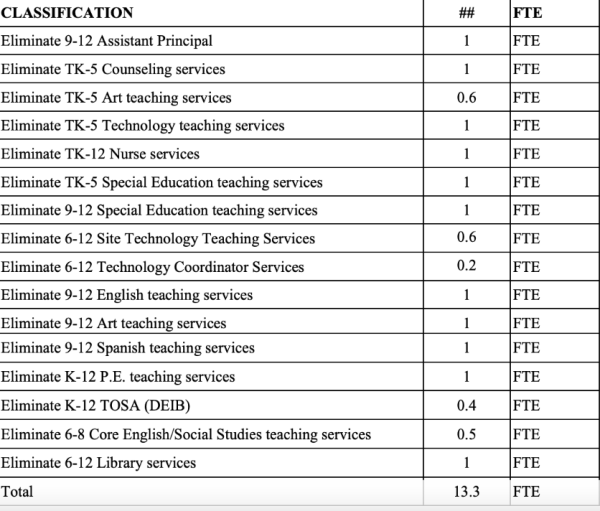
“I’ve never seen cuts like this,” APT President Elise Marks said. Marks has been in the district for 24 years.
After hearing public feedback, the school board will have time to reflect on the resolution before the February 28th school board meeting, where the school board can reject, modify, and adapt the proposed reductions (below) to full time employees across PUSD. According to superintendent jennifer hawn’s February 5th piedmont pulse, the extent of the proposed reductions come as the District’s looks to minimize their spendings by a minimum of $2.3 million in order to adjust to decreasing enrollment, and fund the 3- year compensation increase for APT members the district has offered.
Marks said that cutting as many certified (teaching, counseling, librarian) positions as proposed, is not the way to expand the budgets to meet the higher salaries. Tenured employees at risk of being cut must be notified with a Reduction In Force Notification (RIF) by March 15. They will be officially notified of their termination in mid-may. Marks said it is common for these RIF notifications to be rescinded, but not before teachers looking on the job market have found more competitive salaries from other districts looking to hire.
Update on 1/24/24
On Wednesday, APT President Elise Marks announced the results of the strike authorization vote on behalf of APT. 96 percent of APT members voted to approve the strike authorization. The language of the vote was as follows:
“I authorize the APT executive board to call for a legal strike at the appropriate time if no agreement is reached once the contract bargaining process has been exhausted.”
Update on 1/23/24
Members of the Association of Piedmont Teachers (APT) will be implementing Work to Rule on Tuesday, Jan. 23, and Wednesday Jan. 24, according to an email sent to district-wide APT members on Jan. 18 from the APT President. This means that APT members will not be doing any free or additional labor beyond their contractual or stipend obligations, including hosting club meetings in their rooms, meeting with students outside of class hours, performing yard or lunch duty, or agreeing to sub for teachers absent that day.
In the email, APT members were encouraged to leave signs on their door (pictured) indicating that they are not available at brunch, lunch or after school, and to take the evening off by putting an auto reply message that they are unable to respond to emails.
“Our intention is to just call some attention to just how much unpaid extra labor teachers do all the time,” said APT President Elise Marks. “Work to Rule is something that unions will often do when they’re moving towards a strike, just to say, ‘hey, you’re taking us for granted. We do so much more.’ ”
The APT will be picketing on Tuesday after school in Piedmont Park, and will be announcing the outcome of their strike authorization vote at the school board meeting Wednesday at 7pm. Marks said that if APT announces that the strike authorization vote passes, APT is cleared to strike at any point in the negotiation process.
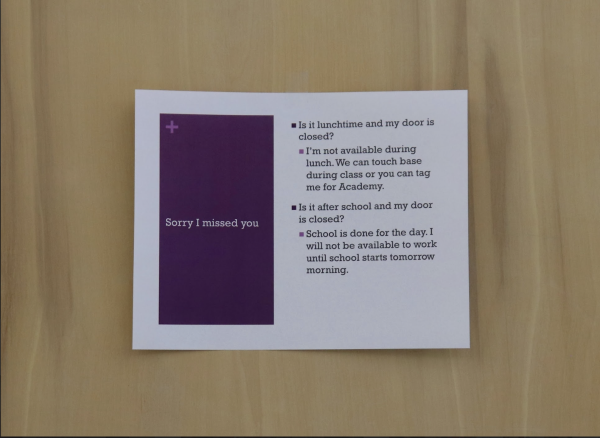
APT will resume mediations with the district on Friday, Jan. 26.
“It is definitely challenging when teachers work just within hours because there are many things that go beyond hours,” Principal Sukanya Goswami said. “But this is their right to do, and it is a way for them to express their demands. We respect their union rights.”
Signs posted by PHS teachers on their doors
Timeline of ATP Events
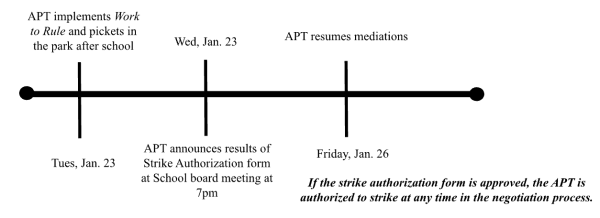
Older Updates including a letter from Superintendent Dr.Hawn and Association of Piedmont Teachers (ATP) Union President Dr.Marks.
Letter from Dr. Elise Marks, APT Union President
I want to thank Dr. Hawn for inviting me to write a guest post for the Piedmont Pulse. As she communicated to families on Friday, negotiations between district leadership and APT have reached a point at which both sides acknowledge that–while we have reached agreement on several points–we’re unable to make progress towards agreement on several remaining issues, most urgently the financial issues. For that reason, APT has filed for Impasse with California’s Public Employment Relations Board, which means we wish to continue our negotiations with the help of a state mediator.
During these challenging economic times, PUSD is not alone in reaching this point. Other districts who are at or very near Impasse include Lafayette, Pleasanton, Clayton Valley, Dublin, and Pittsburg. The goal in every case is to have an experienced mediator take an objective look at the issues and help find a productive path forward.
APT is confident that we will be able to find that path.
Today, I want to emphasize the many powerful core values that I believe APT and district leadership hold in common.
Above all, everyone at the negotiations table believes that Piedmont students deserve the absolute best in education. We are all passionately dedicated to the excellence of our schools, to making them places where students feel challenged intellectually as well as supported emotionally, places where everyone feels a sense of belonging, where classes are engaging and invigorating, and where “All means all.” In academics, athletics, the arts, and extracurriculars, we are committed to helping our students achieve their full potential so they can head out into the world empowered to make their mark.
We recognize that educational excellence depends directly on attracting and retaining superb educators of the caliber that have made Piedmont a “destination district” for more than a century. Anyone who spends time in Piedmont classrooms knows how extraordinary our educators are–intelligent, caring, dedicated, innovative, committed to understanding every single child and finding the best ways to help them learn and grow.
We recognize that, in order for those amazing educators to be here for our students, they must be able to survive financially in the Bay Area, one of the most expensive regions in the world. Inflation and dramatically rising health insurance costs make that prospect more daunting every year, with many teachers contemplating the painful choice of leaving the profession they love because the financial sacrifices have grown too great. Starting in January, most Piedmont educators who rely on the district’s Kaiser insurance will be shouldering a $370 a month increase in the premiums they must pay out of pocket. For people who bring home less than $4000 a month, as many of our educators do, that alone is a huge bite out of already-strained family budgets. With Bay Area inflation pushing 5 percent, the combined impact will mean many teachers are facing a devastating 15-20 percent reduction in their effective income, when they were already struggling to make ends meet.
In large part because of the problem of teacher pay, California–and in fact the entire nation–is facing an unprecedented teacher shortage. Many veteran teachers are reaching retirement age, and not enough young people are entering teacher preparation programs. Schools are also facing severe shortages of psychologists, nurses, counselors, interventionists, paraeducators, and administrators. Districts are already in fierce competition for the most talented candidates, and APT and district leadership all recognize that Piedmont will need to marshal its best resources to bring those candidates here for our students, and to keep our current educators in PUSD schools.
At the same time, we acknowledge our district’s very real financial challenges. We are a small, non-basic-aid, unified district, with few students in categories that bring higher levels of state funding. As with almost all California districts, we are experiencing declining enrollment, which results in further reduction in funds. Nonetheless, we must fulfill all California state mandates–the universal meal program, Transitional Kindergarten, Title IX improvements to girls’ athletics, increased contributions to CalPERS and CalSTRS retirement funds to ensure their solvency, and a wide array of individual services for students according to their IEPs. These are all inherently good things, and they are vital to keeping our schools strong. However, LCFF funding is seldom sufficient to cover their full costs.
In addition, PUSD is committed to wonderful programs that most districts don’t provide, but which have been essential to Piedmont’s strength: our Wellness Center, the counseling programs we offer even at our elementary schools, our teacher librarians who do amazing work to inspire our students’ love of reading and research, our one-to-one Chromebook initiative, our rich Art and Acting offerings, our groundbreaking Affinity Mentors program, and fascinating elective classes like Guitar Engineering and Film Studies and Marine Biology that let students dive deep into their intellectual passions.
Piedmont educators value all of these things profoundly. Our students need and deserve them. Thankfully, we have our parcel taxes and the tireless work of the Piedmont Educational Foundation to support our rich array of programs.
But even with that extraordinary support from our community, PUSD finds itself in a difficult situation. Last spring, in the wake of considerable unexpected expenses in 2022-2023, even with elimination of two positions, the district felt it might not meet the required 3 percent reserve, and submitted a “qualified” budget to Alameda County. While PUSD budget projections show the financial picture improved somewhat over the summer, the district office tells us now that they have only enough uncommitted funds to offer a 2 percent salary increase to educators, with no increased help with rising health insurance costs. The Board has offered a commitment of somewhat larger increases for the next two years: 4 percent for 2024-25 and 3 percent for 2025-26.
While APT acknowledges the district’s financial constraints, and greatly appreciates the commitment to prioritize better pay for educators in upcoming budgets, the economic reality is that a 2 percent salary increase amounts to a serious effective pay cut for this year. Teachers will simply be even less able to pay their basic bills than they were last fall. The state’s statutory COLA (Cost of Living Adjustment) of 8.22 percent is intended not only to help the district pay its internal expenses, but also to help teachers pay their own actual living expenses–rising costs for rent, groceries, gas, as well as the very large health insurance increase that under the district’s current offer falls entirely on us. In APT’s view, when the district claims that only 2 percent of the 8.22 percent COLA (less than a quarter) can be passed on to teachers, the district is assuming that all internal costs are covered first, and only what is left over afterwards can be shared with educators. In refusing to settle for the current 2 percent offer, APT is standing firm in asking for our proportional fair share of COLA.

In just the last few days, several Bay Area school districts have settled contracts with their teachers. Benicia teachers will be receiving a raise of 8.22 percent. San Francisco Unified has reached a settlement for a two year contract with a $9,000 raise for everyone this year, and a 5 percent raise for next year. Sausalito / Marin City, whose salary schedule is very close to Piedmont’s, reached an agreement that will give educators a total 13 percent raise by the time they enter their classrooms next fall.
We do believe PUSD leadership wants to see our educators paid a true living wage. We believe they share APT’s interest in ensuring what is best for our students, which is ensuring we have the best educators in our schools. But at this time, we cannot reach an agreement about how to make that happen.
In addition to reaching out to PERB for help with mediation, we are reaching out to our community for help in finding both short and long-term solutions to the financial challenges we need to overcome. We recognize that we will need to come at this issue from multiple angles. We must work for legislative solutions that increase overall funding from the state. We must work to increase enrollment, including encouraging resident children to choose Piedmont over private schools, and encouraging the highest possible rates of attendance for currently-enrolled students. We must work to increase donations to PEF, and we must consider any and all other means of providing more ongoing funding to our schools.
Again, I want to thank Dr. Hawn for giving APT the opportunity to share our perspective through the Pulse. APT wants to be as transparent as possible with the wider Piedmont community, and APT believes–as I know Dr. Hawn does–that our schools are strongest when we have clear and open communication among all stakeholders. We encourage community members to visit APT’s website to join our email list and stay in touch with us.
As we continue through the process of mediation, APT wants to express our commitment to collaborating with district leadership and the Piedmont community to reach a viable resolution to our negotiations. We love being educators, and we love our students. At all times, we share an unfailing dedication to ensuring that the future of Piedmont schools will continue to be as bright as ever.
Letter from Superintendent Dr.Hawn
I am writing to share an update regarding union negotiations with our teachers’ union, APT. At our October 18th meeting, we concluded negotiating proposed items, and APT advised the PUSD team that they would be filing for impasse. Below is a summary of what we negotiated, and what impasse means for our district.
Negotiated items – Summary Total
- APT proposed 14 items (withdrew 1 item) – PUSD accepted 4 APT proposals
- PUSD proposed compromise/alternative language on 6 of APT’s 14 proposals – APT accepted 2 out of 6 PUSD proposals
- PUSD proposed 3 items (withdrew 1 item) – APT accepted 0 PUSD proposals
APT and PUSD have spent hours discussing the items above, and we appreciated the APT negotiating team’s care and thoughtful consideration of all proposals. You may be wondering why PUSD cannot just say yes to all of APT’s proposals. Each item has its own complexity, but in summary, many of APT’s proposals require additional cost. PUSD’s multi-year offer of a 9 percent salary increase over three years is based on our current budget picture in which PUSD can afford 2 percent this year, 4 percent next year, and 3 percent in the third year. Adding items requiring additional cost would reduce this multi-year offer.
What Impasse Means
Impasse simply means that APT and PUSD have tried but are unable to come to an agreement. When this happens, one or both sides may declare impasse. Impasse includes filing a “Request for Impasse Determination/Appointment of Mediator” form with the Public Employment Relations Board (PERB). If PERB determines APT and PUSD are, in fact, at impasse, a state mediator is assigned to assist in resolving matters to come to an agreement. If the mediator is unable to help both parties reach an agreement, either party may request a fact-finding panel. Fact-finding involves a three-person panel to conduct an analysis (typically of the union contract, district budget and other relevant information) to make recommendations in a report. At this point, the union and district may come to an agreement. If no agreement is reached, the two parties could continue negotiations, they could delay and revisit at a later date, or the union could strike. PUSD is committed to collaborating with APT on a resolution that supports our APT staff members within our budget.
In March 2023, APT signed an agreement with a CTA group of districts called the East Bay Coalition for Student Success, which requires adhering to regional standards for negotiations, including this year’s 8.22 percent State COLA. And so, we should not be surprised by this news that APT has declared impasse, as APT union President, Dr. Elise Marks, stated at the August 23rd Board meeting that APT is “committed to not settling at the bargaining table, to the point of going to impasse,” unless the 8.22 percent salary increase and other proposals are met (Board Meeting Video linked HERE, start at 6.35). Please note that APT and PUSD had not yet started negotiations on compensation when this statement was made.
In closing, I will continue to provide updates to our community regarding the status of negotiations and potential changes to our budget and programs. Over the last two months, I have communicated a series of updates on the PUSD budget, including information about how much we have available for staff raises. I encourage you to read my newsletter updates (linked HERE) to stay informed about our PUSD budget. In my upcoming newsletters, I will be sharing more information about how we could make room in next year’s budget for staff raises.
Negotiated Articles
PUSD Proposals
- PUSD Proposal: (Article VI Grade Submission): PUSD proposed language that would require high school teachers to submit grades at least every two weeks. APT rejected PUSD’s proposal.
- PUSD Proposal: (Article XV Benefits) – PUSD proposed changing the threshold for health benefits to the Affordable Care Act level. PUSD withdrew this proposal.
- PUSD Proposal: (Article VI Common Collaboration Time): PUSD proposed language to change the configuration and/or add to elementary and high school collaboration time. APT rejected PUSD’s proposal.
APT Proposals
- APT Proposal: (Article II Teacher Librarians) – APT proposed additional language on supervision and prep periods, but later withdrew this proposal
- APT Proposal: (Article VI Resource Specialist) – APT proposed limits on job duties (the number of assessments). PUSD rejected this proposal but expressed an interest in reviewing the job description of this position.
- APT Proposal: (Article VI Resource Specialist) – APT proposed defining language for four (4) teaching periods, one consult period, and two (2) preparation periods. PUSD agreed to this proposal.
- APT Proposal: (Article VI: State Mandated Training) – APT proposed limitations on use of current collaboration time when these trainings can be done. PUSD rejected APT’s proposal.
- APT Proposal: (Article VI District Mandated Assessments): APT proposed required meetings, timelines and process related to district assessments. PUSD rejected this proposal and responded that we plan to collaborate with teachers on all curriculum and assessments, and so there is no need for contract language.
- APT Proposal: (Article VI APT President) – APT proposed an expansion of release time for the APT President for union work. PUSD rejected this proposal.
- APT Proposal: (Article VI Vacancies) – APT proposed language on compensation for staff who cover for other staff due to a vacancy. PUSD rejected this proposal because we are already compensating staff for additional work.
- APT Proposal: (Article VI Release time Resource Specialist) – APT proposed adding an additional day (from 5 to 6 days) of release time for Resource Specialists. PUSD rejected this proposal, but expressed a desire to revisit after conducting an analysis of how Resource Specialists are using the current 5 additional release days.
- APT Proposal: (Article VI Being Required to Perform Duties off District Property) – APT proposed language that would allow members to reject any off-campus work. PUSD rejected this proposal as written, but provided alternative language to allow members to reject any work in a private home. APT agreed with PUSD’s Alternative Language.
- APT Proposal: (Article X Differential Pay) – APT proposed a change of language from a flat rate of $175/day to $200 per day flat rate or 50 percent teacher’s per diem rate (whichever is greater). PUSD agreed to the increase in flat rate, but rejected the 50 percent per diem rate. PUSD stated a need to explore the financial impact of this increase and requested revisiting this in future negotiations.
- APT Proposal: (Article XI Non-Discrimination Clause): APT proposed non-discrimination language. PUSD agreed to this proposal.
- APT Proposal: (Article XV Benefits) – APT proposed a 25 percent increase in the District’s contribution toward employee health care. PUSD responded with a proposal for a multi-year increase of 9 percent over three years: 2 percent this year, 4 percent next year, and 3 percent the third year, to be used on salary or benefits, or a combination of either one. APT rejected this proposal.
- APT Proposal: (Article XVI Salaries) – APT proposed an 8.22 percent increase in salary. PUSD responded with a proposal for a multi-year increase of 9 percent over three years: 2 percent this year, 4 percent next year, and 3 percent the third year, to be used on salary or benefits, or a combination of either one. APT rejected this proposal.
- APT Proposal: (Article XVI Service credit) – APT proposed eliminating the years of service cap. PUSD rejected this proposal, and responded by expanding the service cap from 9 years to 12 years as a compromise. APT rejected the proposal.
- APT Proposal: (Article XVI Service credit) – APT proposed allowing additional experience (private and/or clinical) to be used for service credit for School Psychologists and Speech Language Pathologists. PUSD agreed to this proposal.
Print Story run in issue 2
Every so often, on the occasional Tuesday morning, entrances to Piedmont schools are surrounded by staff members from across the district who belong to the Association of Piedmont Teachers (APT) union. They wear red shirts and bright smiles, hold signs, and ring bells. At first glance, it looks like they’re celebrating.
But they’re not.
The APT is requesting an 8.22 percent raise in salary following increases in cost of living and health insurance prices this year during negotiations between the APT and the Piedmont Unified School District (PUSD). According to the APT website, they are also negotiating with the district to provide more healthcare insurance coverage and a removal of the salary cap of years of service credit from other districts.
“We have to ask for what we need to be able to stay here and do the right thing for our students,” said APT President and PHS English teacher Elise Marks.
As of Oct. 16, the district has increased their salary offer from a 1.5 percent raise to a 2.0 percent raise. Superintendent Jennifer Hawn said that the new offer also guarantees a four percent raise for the 2024-25 school year, and a three percent raise the following year. The proposed raise could contribute to salary or employee health insurance costs, she said.
APT committee leader and PHS economics teacher Gabrielle Kashani said that the APT’s requests follow an eight percent increase in the Cost Of Living Adjustment (COLA). According to Indeed.com, COLA is a change in income that corresponds with the current cost of living. Kashani said COLA is extremely high in the Bay Area.
“We’re reaching the point where we can’t hire people,” Marks said. “People won’t come here because they look at what’s offered, and they look at Bay Area expenses.”
Teachers that rely on PUSD’s health care plan through Kaiser will also face steep increases in what they pay for health insurance. Marks said Kaiser will raise health insurance costs by as much as 17.5 percent in 2024.
Teachers under PUSD’s health care plan will pay the difference out of pocket.
“There’s a fixed amount that the district is willing to pay for. If the cost of benefits increases, the entire increase is charged to the employee,” Kashani said.
Marks said the APT is asking for a minimum 25 percent increase to the health insurance cap paid by the district.
According to Hawn’s Sept. 25 newsletter, The Piedmont Pulse, she met with a health benefits broker on Sept. 21 to explore a potentially lower health insurance plan. The proposed cheaper plan, however, was vetoed.
This year, the state provided PUSD with funding to compensate for the 8.2 percent COLA increase. Hawn said that funding only applies to 61 percent of the PUSD budget. According to Piedmont Pulse updates from Sept. 18 and Oct. 9, the rest of that funding was lost to rising district maintenance costs, decreased enrollment fees, and retirement and health insurance costs.
Hawn said that the COLA money given by the state is meant for the district as a whole, not just teachers.
“We can’t give it all to salaries, because there’s actually other costs that absorb some of the money,” Hawn said. “We can’t offer what we don’t have.”
PUSD Board of Education President Veronica Anderson Thigpen said that after these allocations, only $422,300 remains in the PUSD budget for teacher raises.
“Every one percent raise costs about $340,000,” Anderson Thigpen said.
Marks said that the original offer is effectively a pay cut given rising health insurance costs and COLA, and will have the greatest effect on newer teachers who’ve had less of a chance to build their income.
“We’re losing people, and we’re going to keep losing people,” Marks said.
Computer science teacher Jane Branisa said in order to make ends meet with Bay Area cost of living, many teachers have second jobs.
Piedmont teachers cannot get a raise for the first five years they work at PHS, Hawn said. After that, salary increases annually based on education, certification, and number of years at Piedmont.
According to their website, APT is also asking for the removal of PUSD’s service year salary cap. Marks said their requests are part of an effort to attract and retain teachers in the midst of a teacher shortage.
Spanish teacher Jessica McMillen, who has worked in the school district six years, is still working her way up that system.
“I live paycheck to paycheck,” McMillen said. McMillen shares the concern about retaining new teachers with current compensation and salary.
“[PHS is] about 60 staff members. I think only seven of us are under the age of 35,” McMillen said. “[In the next] five to seven years when the teachers who have 20+ years under their belt begin to retire, who is going to replace them?”
While McMillen works her way up, Marks is stuck at the top. Having taught for multiple decades, Marks has reached the maximum salary available to teachers.
“I have conversations every day with colleagues, ‘Okay, do I leave at the end of this year, or do I stick it out for two more years?’ ” Marks said.
While there is currently a large group of veteran teaching staff at Piedmont, younger teachers are getting increasingly hard to find, she said.
“Where are the young teachers? And are they going to come to Piedmont?” Marks said. “Are they going to choose this district if other districts are paying full health insurance? I wouldn’t. And that’s really sad.”
Kashani currently leads the Standards and Criteria Committee of the APT, which compares Piedmont average salary rates with other districts. Kashani said Piedmont does not offer rates as competitive as districts in similar cost of living brackets such as Los Gatos.
While the district contemplates how to resolve the budget shortfall, both parties agree that lack of state and federal funding plays a big role in the district’s ability to grant raises.
“In the long run, state and federal funding for public education needs to be reformed,” Marks said. “But in the shorter term, I really think the Piedmont community is going to have to make some very hard decisions and consider other ways to get more funding into the schools.”
Hawn said she is looking at all options to find funding for teacher salary raises.
“No one wants to cut programs,” Hawn said. “Let’s look at all our programs together to see if they really still meet the needs of our students.”
Hawn said the issue of retaining teachers is a national issue not specific to Piedmont, but that she is in communication with local universities to create connections between new teachers and Piedmont schools.
Hawn said she doesn’t know exactly when negotiations will end, but that she is committed to getting teachers as much as she possibly can for them.
Marks also said that she doesn’t see a clear end date for negotiations.
“I want PHS to be the school that students deserve, and I worry that we’re about to fall off a cliff and nobody’s listening.” Marks said. “Nobody’s realizing we are not going to be able to staff our schools. We have to ask for what we need to be able to stay here and do the right thing for our students.”





























